Contents
- Formal Attire for Men – Dress Code Style Guide 2023
- What is Formal Attire?
- Formal Attire In The Age Of Sportswear
- Formal Wear vs Semi Formal Wear
- The New Rules Of Men’s Formal Dress
- Simplify Your Look
- Forget ‘Slim Fit’
- Aim For Comfort
- If You Want Colour, Go Earthy
- Try Trainers
- Rule #6: Forget Old School ‘Rules’ Men’s Of Formal Wear
- Smart Knitwear
- For Shoes, Think Versatility
- The Modern Formal Attire Shopping List
- The Unstructured Suit
- A Textured Blazer
- A Knitted Tie
- The Jersey Shirt
- Some Rubber Soled Dress Shoes
- Oversized Outerwear
- Formal Attire: A Modern Man’s Guide To Formalwear Dress Codes
- Dinner Jacket or Tuxedo?
- Classic Black Tie
- Colour
- Essentials
- Accessories
- Black Tie With A Twist
- The Best Brands For Black Tie
- Morning Dress
- Colour
- Jacket Fit
- The Shirt & Trousers
- Accessories
- The Best Brands For Morning Dress
Formal Attire: A Modern Man’s Guide To Formalwear Dress Codes
In general, if you find yourself staring at an invitation that requests formal attire, it’s a safe bet that it’s a black or white tie event, where you’re expected to show out in your best and most polished dress. As a rule of thumb, if an event calls for formal attire, it’s going to be fancy, and you don’t want to stick out as a slob in a crowd of well dressed men.
Formal Attire for Men – Dress Code Style Guide 2023

We’ve waxed lyrical about how men’s dress codes are breaking down, how casual dress is taking over and why sportswear is the de facto king of men’s fashion. But in this new relaxed world, there is one mainstay that refuses to disappear: the suit.
We’ve seen it rise and fall in popularity over the years, but it never truly went away. In a true sign of the times, tailoring featured extensively in the first Louis Vuitton collection from Virgil Abloh, shown alongside cutting edge streetwear suggesting the two have finally become symbiotic. The suit, and old ideas of formal attire in general, no longer has to have stuffy connotations – it can be worn through choice; it can be sexy and relevant.
After all, no matter how casual fashion gets, there are still times when you’ll need to wear one – weddings, fancy parties, big job interviews, they generally all require one. “Many people now only wear formal clothing to weddings and funerals”, owner of Grenson , Tim Little admits. But how can you wear yours without looking old hat?
What is Formal Attire?
Ah, the ever mystifying question of what is formal attire exactly?
In general, if you find yourself staring at an invitation that requests formal attire, it’s a safe bet that it’s a black or white tie event, where you’re expected to show out in your best and most polished dress. As a rule of thumb, if an event calls for formal attire, it’s going to be fancy, and you don’t want to stick out as a slob in a crowd of well dressed men.
Traditionally, men’s formal attire indicates a black tie event, which means a black tuxedo and a tuxedo shirt, and there’s very little wiggle room around it. Paired with a starched white shirt and cummerbund, the black tie look is the epitome of mens formal wear.
If it’s specifically indicated that white tie is required, you’ll have to add a bow tie and tailed jacket into the mix.
Some business environments will also require formal attire, but we’re not saying to go wearing your tux to the office any time soon. Business formal work attire generally refers to a standard suit with a freshly pressed or non iron dress shirt. Paired with leather dress shoes and you’ll look as if you’ve stepped out of Mad Men’s Sterling Cooper.
However, these days, formal attire has deviated from tradition a bit. The lines are increasingly blurred and it’s easier to get away with a dressed-down version of formal attire, so long as the look is polished and sleek.
Keep reading to learn the new rules of men’s formal attire and how to make sure you’re always dressed for the occasion.
Formal Attire In The Age Of Sportswear
Up to only a few years ago, the formal attire equation was simple: suit, shirt, tie, pocket square, smart shoes, done. Whilst it ticks all the formal boxes, this is a look that’s far from inventive and has been knocking around for decades in various forms. It’s no wonder only one in ten people in the UK now wear a suit to work – it’s become boring, and stinks of conformity and boardroom meetings.

Sandro
It’s a good job then designers are beginning to herald in a new era for the old faithful. Forget everything you know about suits – this is tailoring for the next generation, it’s tailoring for those who may never have chosen or even needed to wear a suit before. It’s got nothing to do with Savile Row. It kicked off with the spring-summer shows of 2018 – there was Louis Vuitton’s all-white double-breasteds; Dior’s couture-inspired suits worn with nothing underneath; Paul Smith’s voluminous 1980s takes, and Raf Simons’ oversized designs with no shirt or tie in sight.

COS
What does this mean for you and I? Formal attire has moved on. The suit doesn’t have to be treated like the business accomplice it always has been. Creative director of Savile Row house Gieves & Hawkes John Harrison agrees: “There is definitely an easing up on tailoring”. Yes, there are times when a shirt and tie are needed – those pesky weddings – but you can also replace the shirt altogether, and still be the best-dressed man in the room. From wearing trainers with tailoring to how your suit should fit, here are the new rules of formal attire.
Formal Wear vs Semi Formal Wear
Despite the fact that times are changing when it comes to men’s formal attire, there’s still a line drawn between formal wear and semi-formal wear.
Formal wear will almost always include a dark colored suit (tuxedo) and bow tie, whereas semi-formal dress for men is a bit more flexible. Try a lighter colored suit, or a blazer and slacks with a sharp belt. Semi-formal wear can include a tie, but doesn’t always have to, and shoes can be smart or relaxed.
The main thing to remember is that with semi-formal wear, men have more versatility. You’ll rarely walk into a semi-formal event, look around and feel like everyone’s wearing the same thing. Experiment with colors, patterns and accessories, so long as you incorporate main formal staples like a jacket and dress shirt.
When it comes to formal attire for men, play it safe and dress it up (though daytime events leave some room for different colored suits). Nothing’s more classy than a man in a tux.
In a nutshell, the main difference between a formal and semi-formal dress code for men is the latter leaves room for personal expression, while formal wear should remain, for the most part, traditional.
The New Rules Of Men’s Formal Dress
Can the modern man really be expected to follow the same rules of formal attire that their grandfathers did? Times are changing, and while dress codes remain, the rules are slightly different than they once were.
Keep these eight new rules of men’s formal attire in mind while gearing up for your next event.
Simplify Your Look
When it comes to tailoring, too many people get carried away. No, you do not need a tie pin, collar bar, pocket square, braces, pocket watch and a cigar hanging out of every pocket. Pare things back and let the suit – and your personality – do the talking. Not only will it take less time for you to get ready, you’ll also look less affected and more natural.
For a simple wedding look for example, ditch the pocket square (fussy, unnecessary), and opt for a plain knitted tie with an Oxford shirt. Simple and effective.

Topman
Forget ‘Slim Fit’
‘Slim fit’ has dominated mainstream clothing over the past decade, but it’s on its way out, especially when it comes to formal dress code. Unfortunately ‘slim fit’ tends to translate as ‘too tight’ and nobody wants a suit they can’t move in, or even do up. A suit should be flattering, not contouring, so look for wider cuts that complement your body shape rather than restrict it.

Brunello Cucinelli
Aim For Comfort
A suit doesn’t have to have heavy structure. Whilst those of Savile Row tend to have a militaristic cut – built up roped shoulders, heaving chest canvassing – an unstructured suit strips all of this away, offering a far more comfortable end product that won’t make you feel like you need to stand to attention when you wear it.
Try oversized outerwear over the top for ultimate comfort points. It doesn’t have to be huge, but a coat in the next size up will ensure your suit fits underneath, and it can double as a cosy weekend jacket. Just tailor the sleeve length so you can still see your hands.

Canali
If You Want Colour, Go Earthy
Navy and grey will always be the most popular options, but a colourful suit can make for a striking choice. If in doubt stick to earthy colours of deep greens and browns, which are flattering for most skin tones and keep the rest of the look simple to allow the suit to take centre stage.

Next
Try Trainers
Ah, the age old debate of whether trainers can be worn with a suit. We’ll end it here: yes, it can be done. It’s very easy to get wrong though. The trick is to tone everything down – the suit should be unstructured and made from a more casual fabric such as cotton; wear a T-shirt instead of a shirt, and tailor the hems of your trousers with no break. Oh, and the sneakers themselves should be minimal, too.

Digel
Rule #6: Forget Old School ‘Rules’ Men’s Of Formal Wear
Unfortunately, the traditional origins of tailoring means it comes with plenty of pomp, and a few so-called style ‘rules’ that are dated and need to be ignored. ‘No brown in town’ and ‘never wear navy and black’ are the two that first spring to mind.
Another, and one you’ll read on plenty of styles sites, is that you should never wear a pre-tied bow tie. What purpose does this serve other than to stroke the wearer’s ego that he, in fact, is wearing a ‘real’ bow tie? Well, there isn’t one really. If you’re after a bow tie then, regardless of whether it’s pre-tied or not, go for it. It shouldn’t be untied on the night anyway – you’re not James Bond.

Charles Tyrwhitt
Smart Knitwear
This is perhaps the best rule on this list, and the most effective way of transforming your formal attire. Simply swap your shirt for a fine gauge knit – whether that be a crew neck, roll neck or Breton stripe. This immediately helps to strip away the business-like connotations of the suit, and gives off a contemporary look and feel that simply can’t be achieved with a shirt and tie.

H&M
For Shoes, Think Versatility
What’s the use in having multiple pairs of similar shoes that serve different purposes when you can have one pair that does it all? Save your cash and look for versatility when shopping for footwear on the smarter end of the spectrum. A pair of Derby shoes is always a good option, but look for something a little more robust that’ll pair well with jeans as well as tailoring.
Alternatively try a traditionally formal style – a monk strap or Chelsea boot – but with a chunky commando rubber sole bolted on for ultimate smart casual prowess.

Crockett & Jones
The Modern Formal Attire Shopping List
If your dress clothes are in need of a serious update, here are the must-have pieces any modern man needs for men’s formal wear. Rather than fumbling around in your closet the next time an invitation arrives, have these go-to pieces ready to rumble and you’ll look like the sharpest man in the room.
The Unstructured Suit
If you’re going to own only one suit, opt for one with little to no structure and you’ll find yourself wearing it even when you don’t have to. It’ll be comfortable, easy to wear and you can dress it up or down with ease. Simply wear with a shirt and knitted tie for work, or a T-shirt and trainers for date night.

A Textured Blazer
For times when a full suit is just too much, a blazer worn with complementary trousers is a solid bet. Said blazer should be made from some sort of textured fabric – a herringbone cotton or tweed perhaps – so that it looks as though it was meant to be worn solo.

A Knitted Tie
Whilst it may be less formal than the pure silk variety, the knitted tie is also less stuffy and far easier to wear. Although usually finished with a square tip, you can find the odd knitted tie with a pointed end to replicate the more traditional look of a printed silk version.

The Jersey Shirt
Menswear has evolved, and so too have the fabric options available today. It’s now possible to purchase classic types of shirt in cotton jersey – the comfortable fibre usually reserved for polo shirts. With the same look of a traditional dress shirt, these jersey shirts have a slight stretch meaning more freedom of movement and comfort, yet appear just as smart. A win win

Some Rubber Soled Dress Shoes
Why go for a leather sole when you can have rubber? More durable, waterproof and slip-resistant, rubber soles make for ideal everyday work shoes yet, because they are usually chunkier, they’ll also pair up equally well with your weekend wardrobe.

Oversized Outerwear
To top off your formal look, finish with an oversized coat. Not only will it show your fashion nous and ability to play with proportion, it will also ensure your two-piece fits underneath and will be endlessly more comfortable than a restricting, slim-fit jacket.
Formal Attire: A Modern Man’s Guide To Formalwear Dress Codes
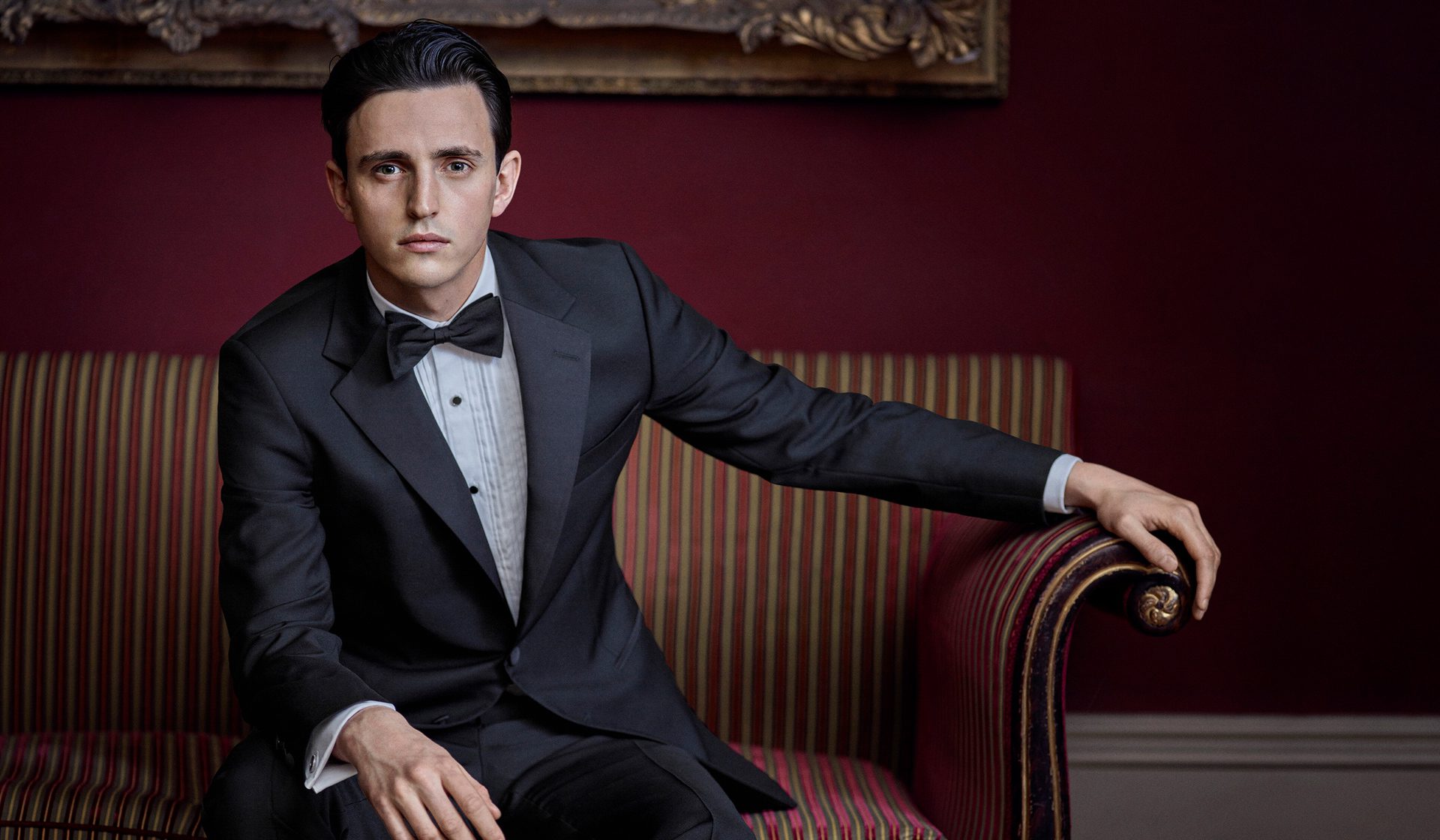
Image Credit: Gieves and Hawkes
So you’ve received the invitation to the end-of-year event, or you’ve decided to finally bite the bullet and get married… whatever the occasion, the time calls for formalwear, which means either black tie, white tie or morning dress, with the details of each one determined by a unique set of sartorial rules that has rarely been bent. White tie was and still is the most formal of formal, and unless your presence is required at state banquets, it’s highly unlikely that you will ever need to trouble yourself with this genre, so we’ll skip that for the purposes of this article. Black tie on the other hand is something all men should know and own, because at some point or another you’ll be invited to an evening function that demands it. Morning dress is specifically for formal events during the day, notably weddings but also certain historic events such as Royal Ascot, where morning dress is a requirement in the Royal Enclosure. With time, that aforementioned ‘unique set of sartorial rules’ has slightly bowed and warped under the pressure of progress, meaning that some degree of subjective interpretation has allowed for greater creativity, although still within the broader remit of ‘formal’, but we’ll get to all that in a bit. Suffice to say that if ‘formal’ ever had a stuffy or elitist air about it, then that has been put to bed by some colourful and stylish creative license in recent years. Men’s formalwear has never been in a better, more fun place with a host of tailors subtly reshaping the tenets that have stood for so long. And if you don’t believe us, ask Daniel Craig, who wore a fuschia pink double-breasted velvet dinner jacket on the red carpet for his last outing as James Bond.
Dinner Jacket or Tuxedo?
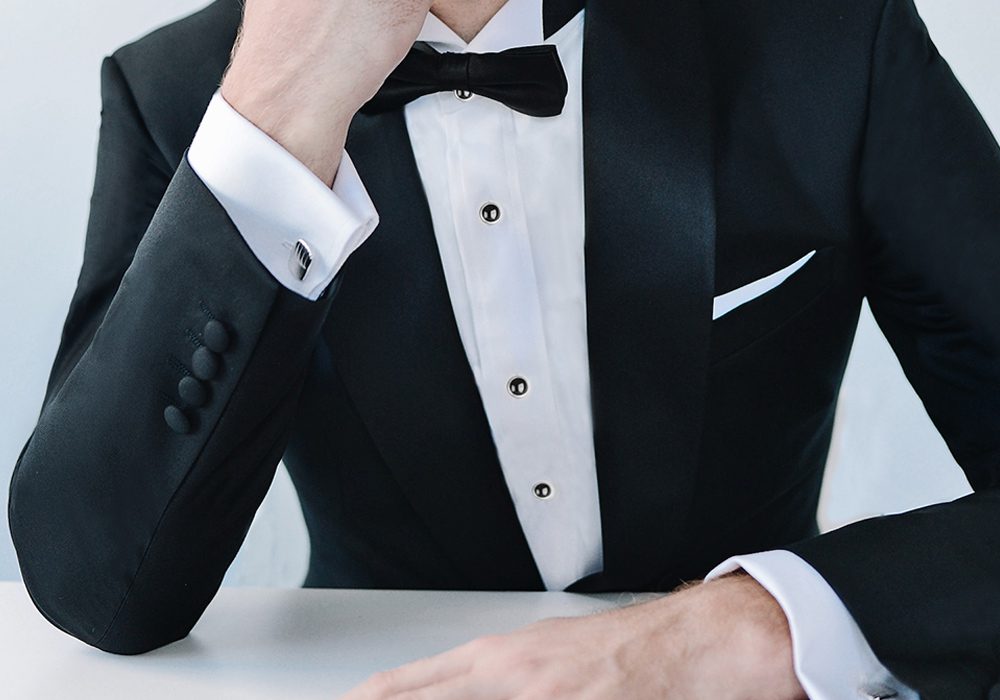
Edit Suits Co
First of all, let’s clear up the confusion between the dinner jacket and the tuxedo. The difference is that there is no difference, only in name. They are one and the same thing. Quite why is an anecdote that refers back to the garment’s very origins. Story has it that the Savile Row tailor Henry Poole & Co was tasked by Edward VII in 1865 to make him a formal jacket he could dine in because he was nonplussed at having to sit in tails all the time. That request spawned what we know today as the dinner jacket or DJ. The creation was spotted by another Poole customer, one James Potter of Tuxedo Park, New York. One or two other Poole customers, having seen Potter’s jacket, also had some made and before you knew it they were known as the Tuxedo boys. The name stuck and so now what the British know as the dinner jacket, the Americans refer to as the tuxedo.
Classic Black Tie
Colour
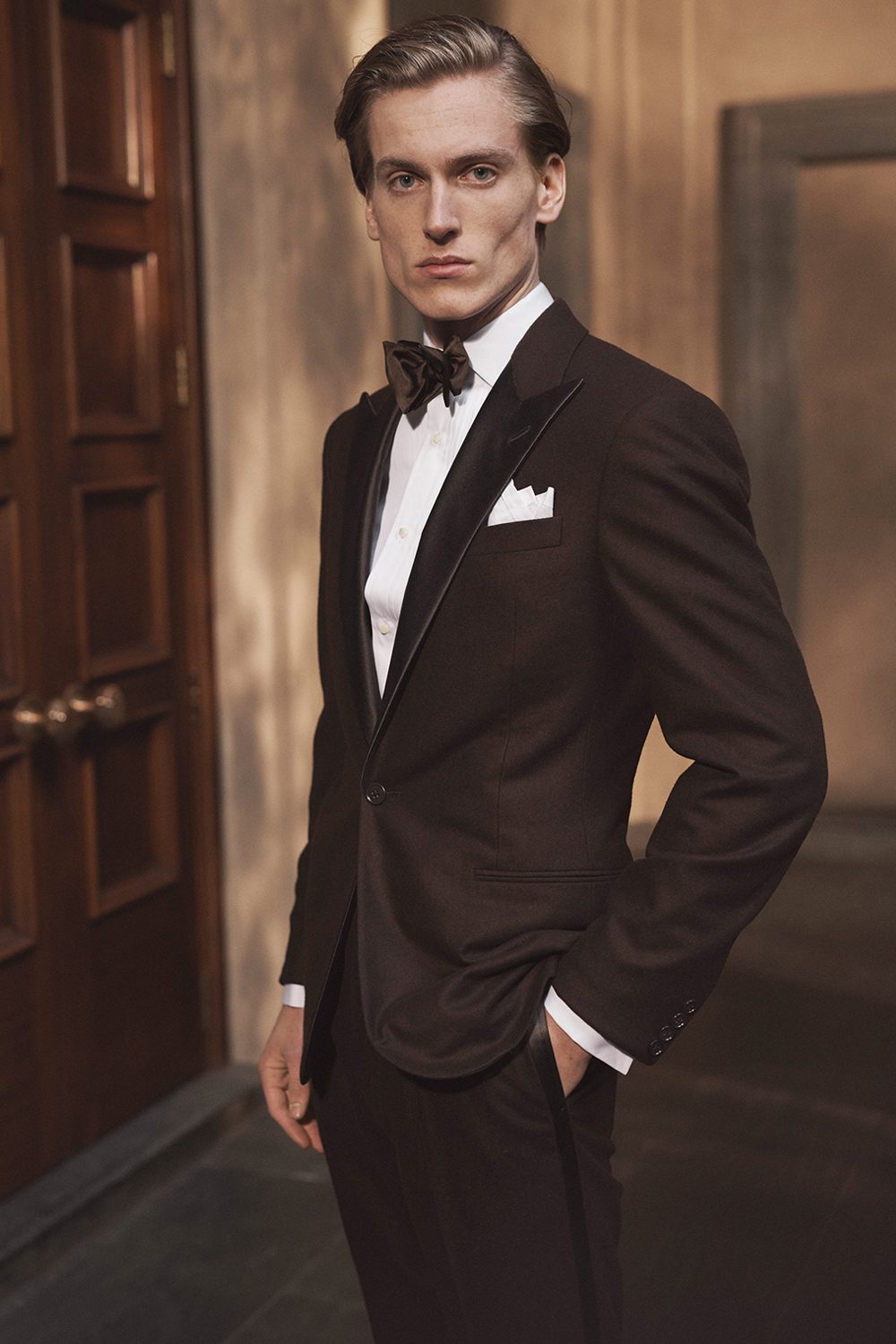
Ralph Lauren
The classic and traditional black tie setup is actually midnight blue wool (or a silk blend) with silk grosgrain lapels. Although today you’ll mostly find black dinner jackets. Midnight blue looks more black than black under artificial light (black has the tendency to cast a brownish sheen), which is perhaps the reason why it was chosen in the first place. Should you choose a midnight blue style, you’ll likely be one of the very few at your event wearing the colour – which is all the more reason if you ask us.
Essentials
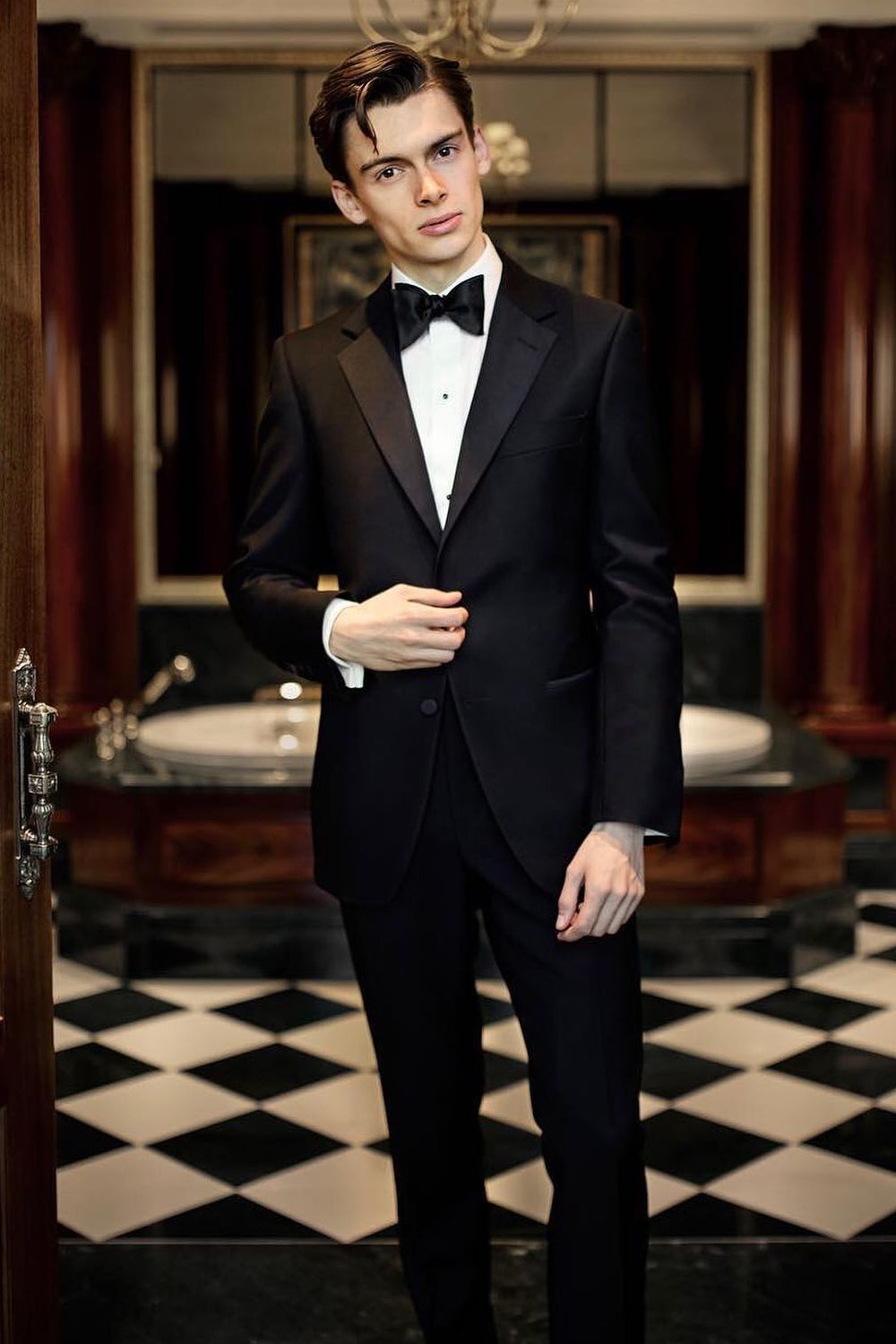
Gieves & Hawkes
In terms of shape, the dinner jacket is all beautiful sharp lines to flatter the torso and give the impression of grandeur. The trousers should feature a single row of silk braid down each outside leg and be naturally tapered, with a slight break at the mid-point of the shin. The shirt should be a classic white evening shirt with a marcella collar, bib and double cuffs. If you prefer to wear shirt studs, they should be black or decorative such as Mother of Pearl to create a nice point of contrast. A midnight blue or black hand-tied bow tie (the size of which should be proportionate to the wearer and wider than the eyes but narrower than the face) is the natural accompaniment, but if you ever see ‘Hollywood Black Tie’ on a dress code, then a simple black neck tie can be substituted. Bookending your outfit should be a pair of black patent leather Oxfords, or failing that, black patent opera pumps, both worn with black silk socks.
Accessories
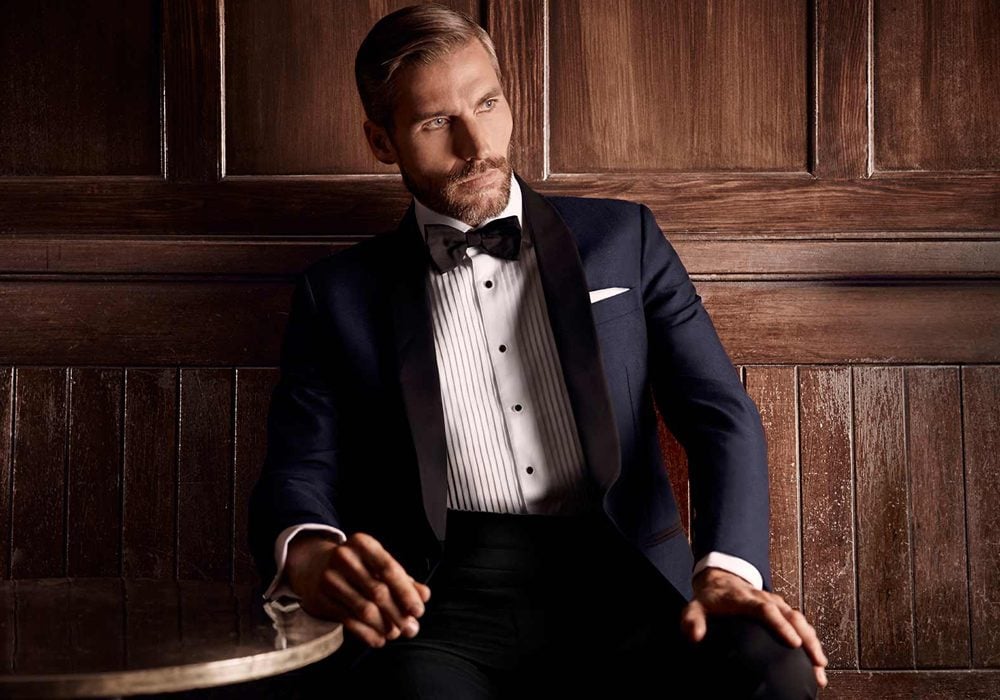
Hackett
Waistcoats are rarely worn with black tie these days. The same goes for cummerbunds, which seem to be regarded as an unnecessary affectation, but if you want to add a swathe of colour about your waist, choose red, white or black. Don’t forget that important little piece of sartorial real estate which is your breast pocket. In here, a pocket square can be diligently folded or stuffed with great artistic flair. We don’t recommend venturing beyond a white square or, at most adventurous, a polka dot style. It would be a sin to have spent good money and even more precious time on a sophisticated black tie ensemble only to wreck it with a clownish silk square.
Black Tie With A Twist
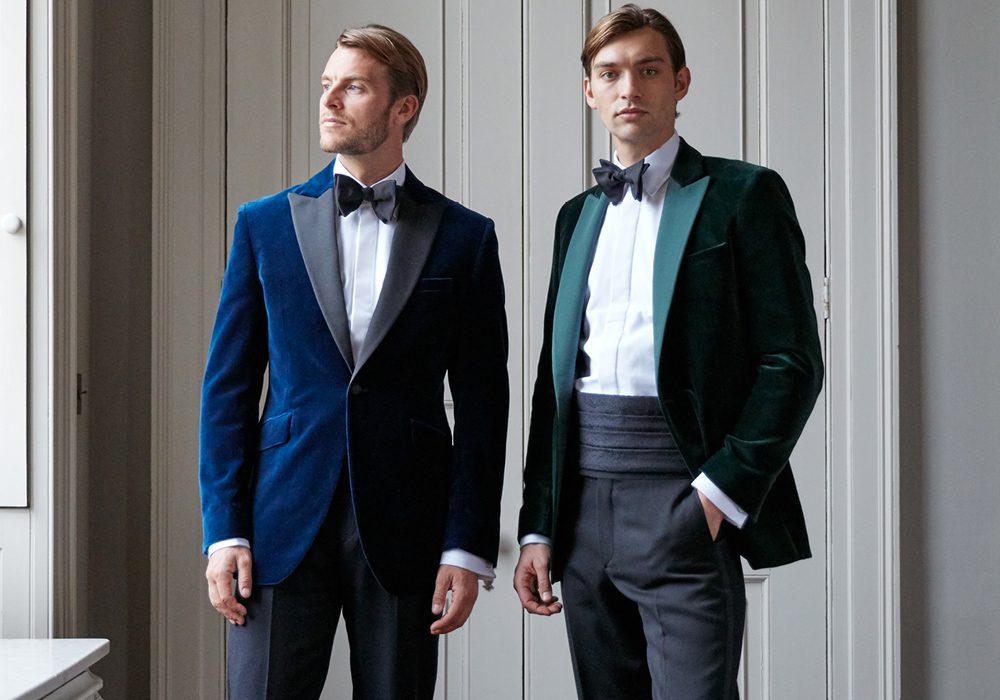
Favourbrook
That’s the classic version ringfenced, but as we mentioned at the top, black tie is definitely enjoying a looser interpretation right now, with many high profile men opting for velvet dinner jackets instead, which we heartily condone. Velvet brings tactility, texture and works wonderfully under artificial lighting, really bringing out the tonal nuances of that rich pile – Daniel Craig’s fuschia pink double-breasted dinner jacket is a good case in point. If pink is a stretch too far on the spectrum, then you’ll find plenty of great options in navy, ochre, burgundy and racing green.
The Best Brands For Black Tie
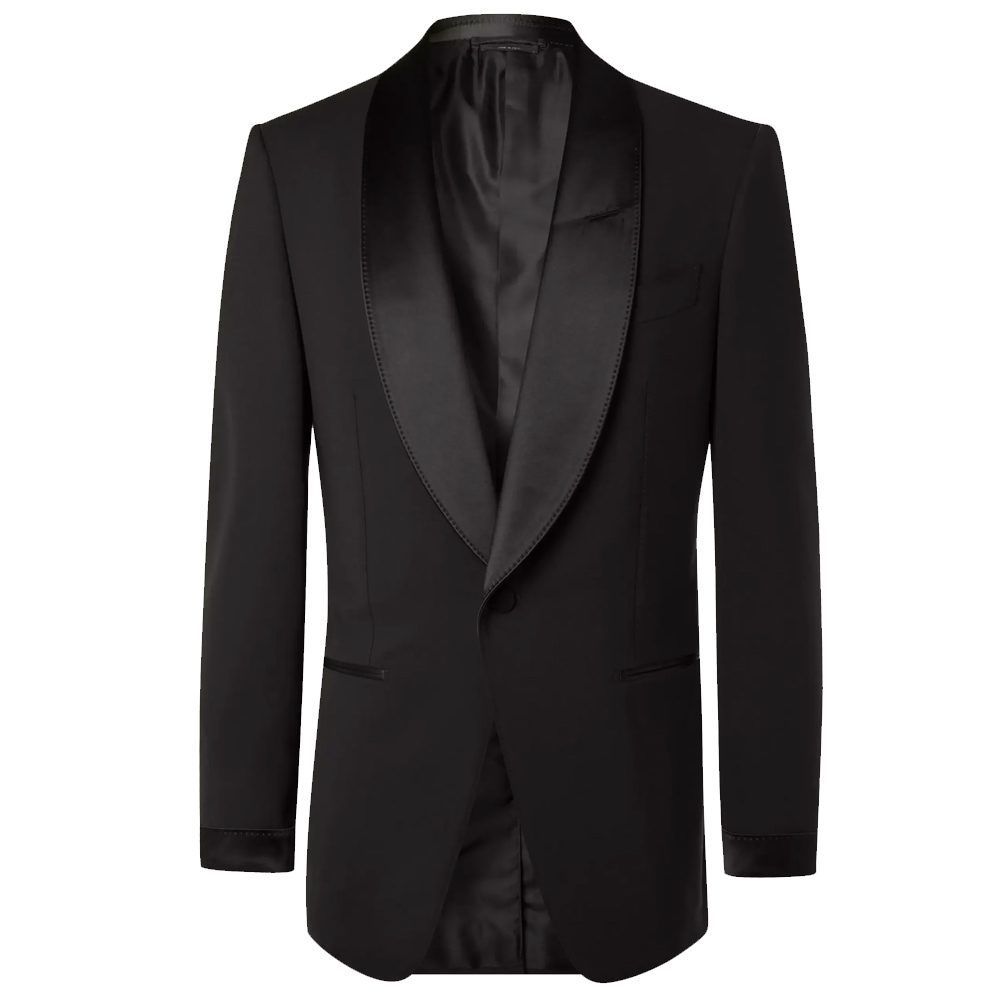
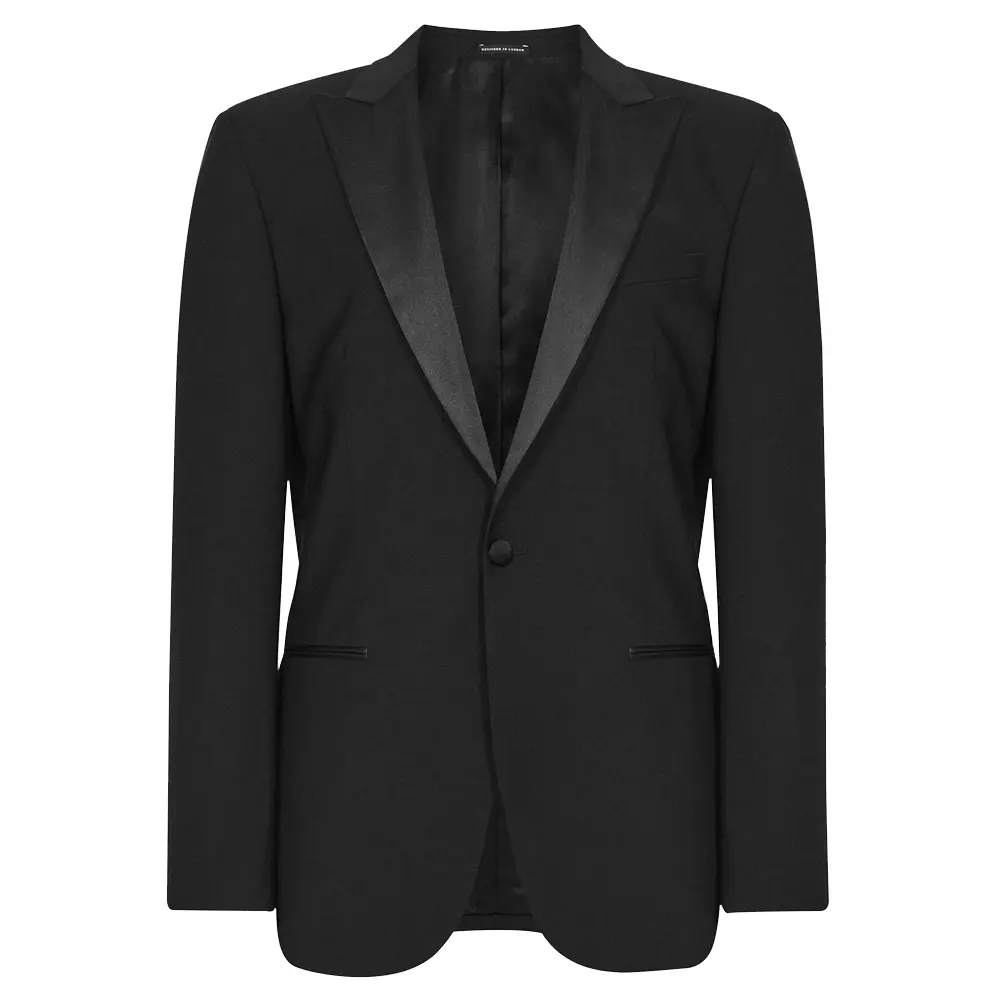
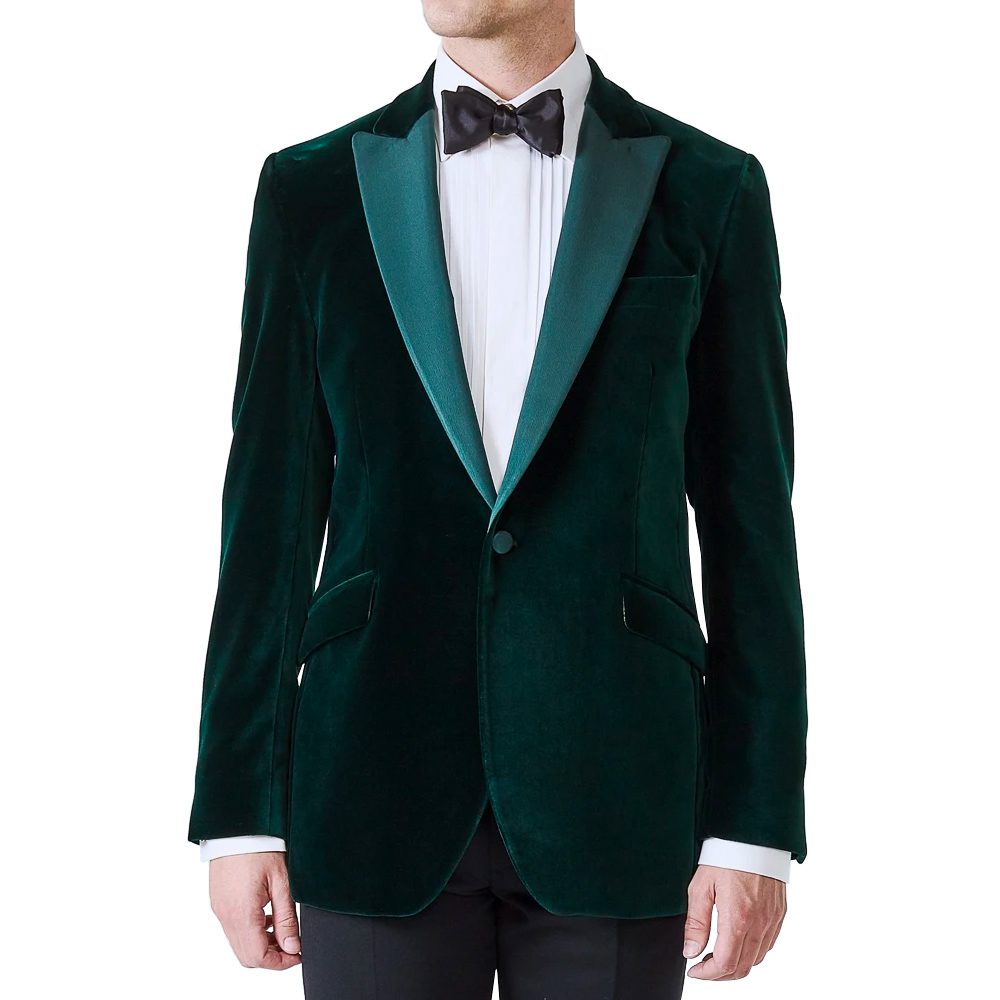
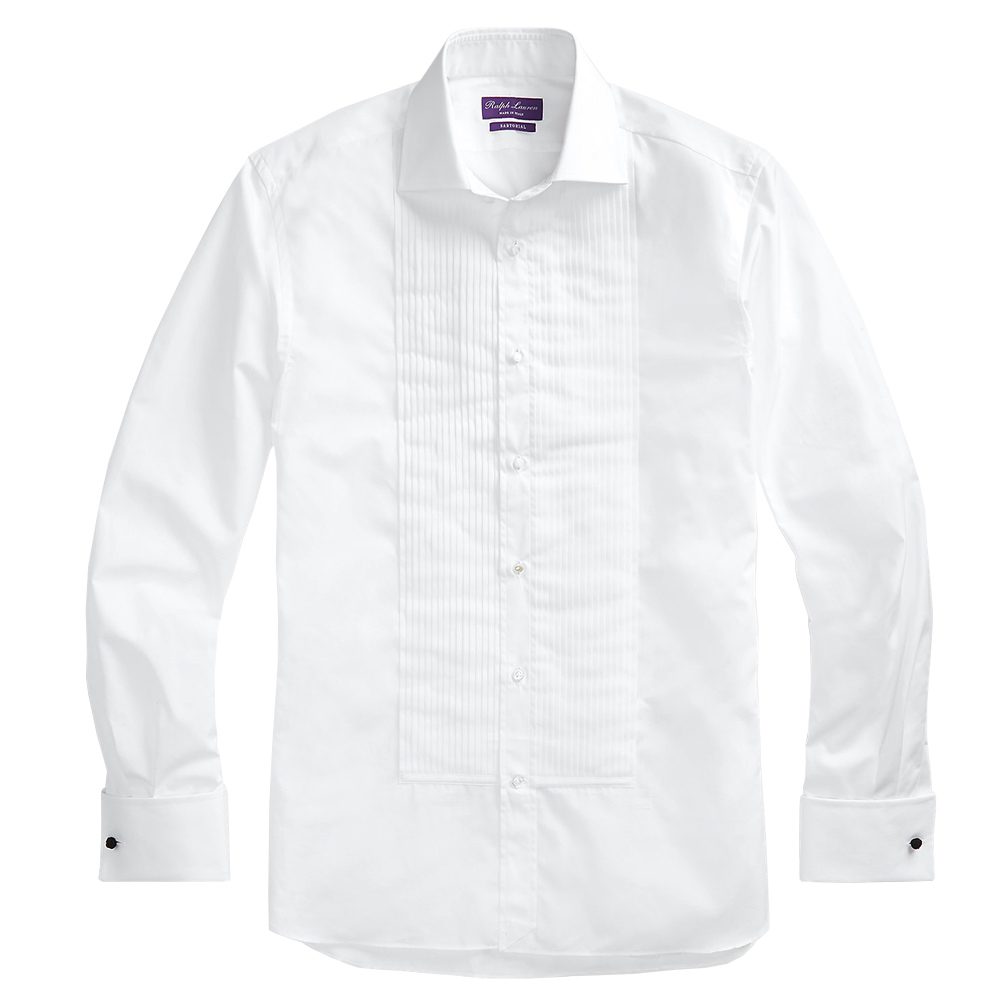
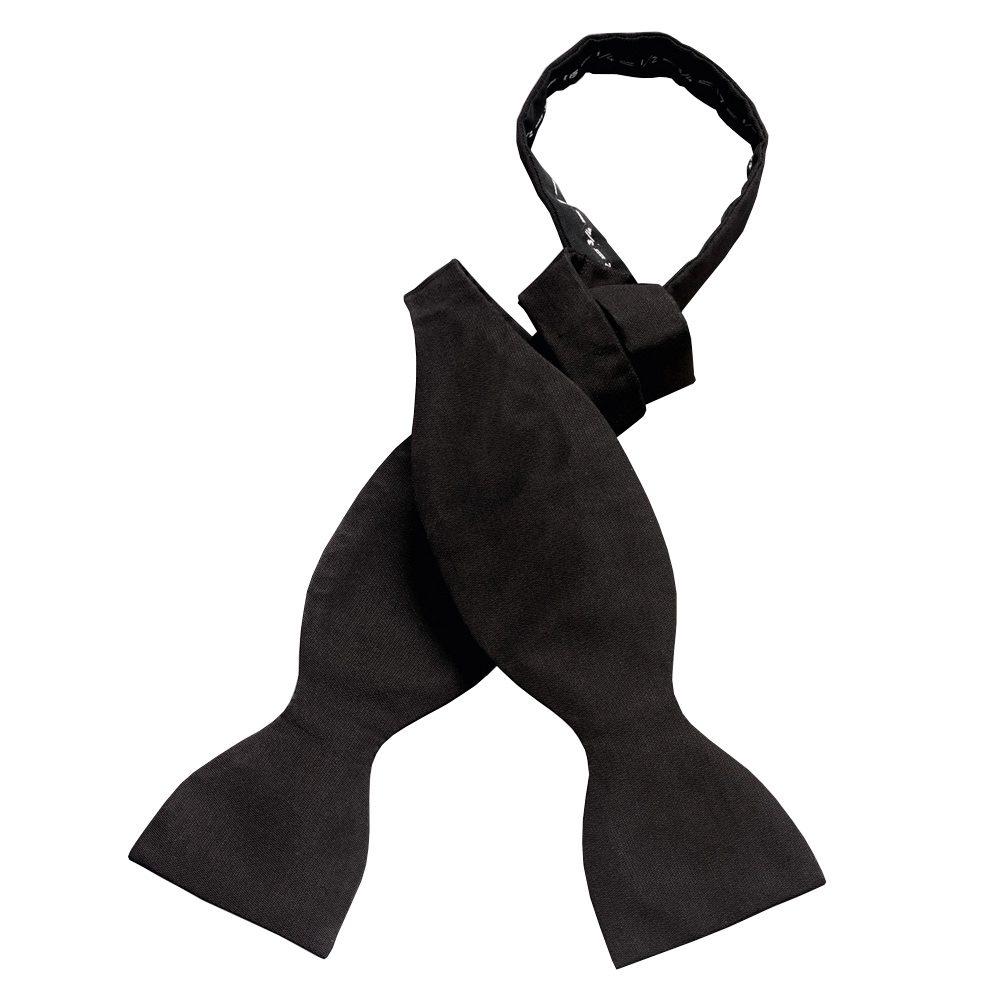
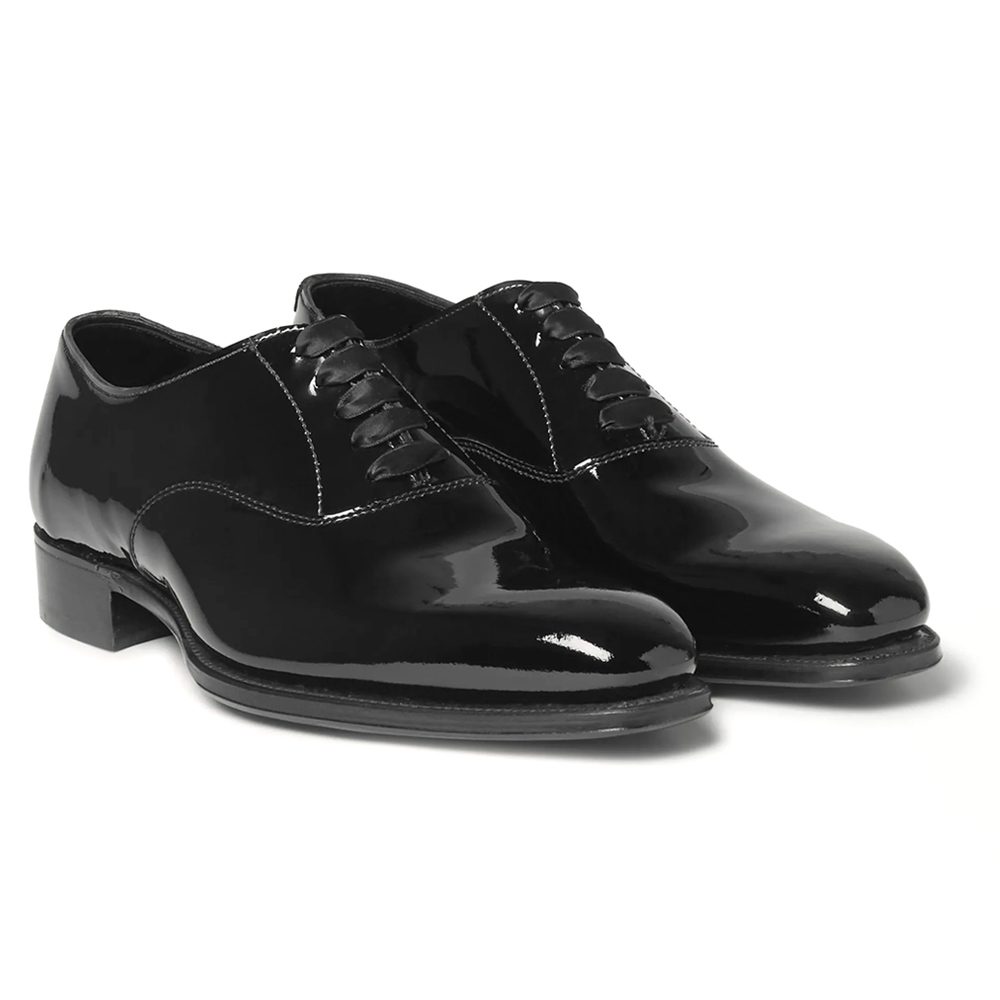
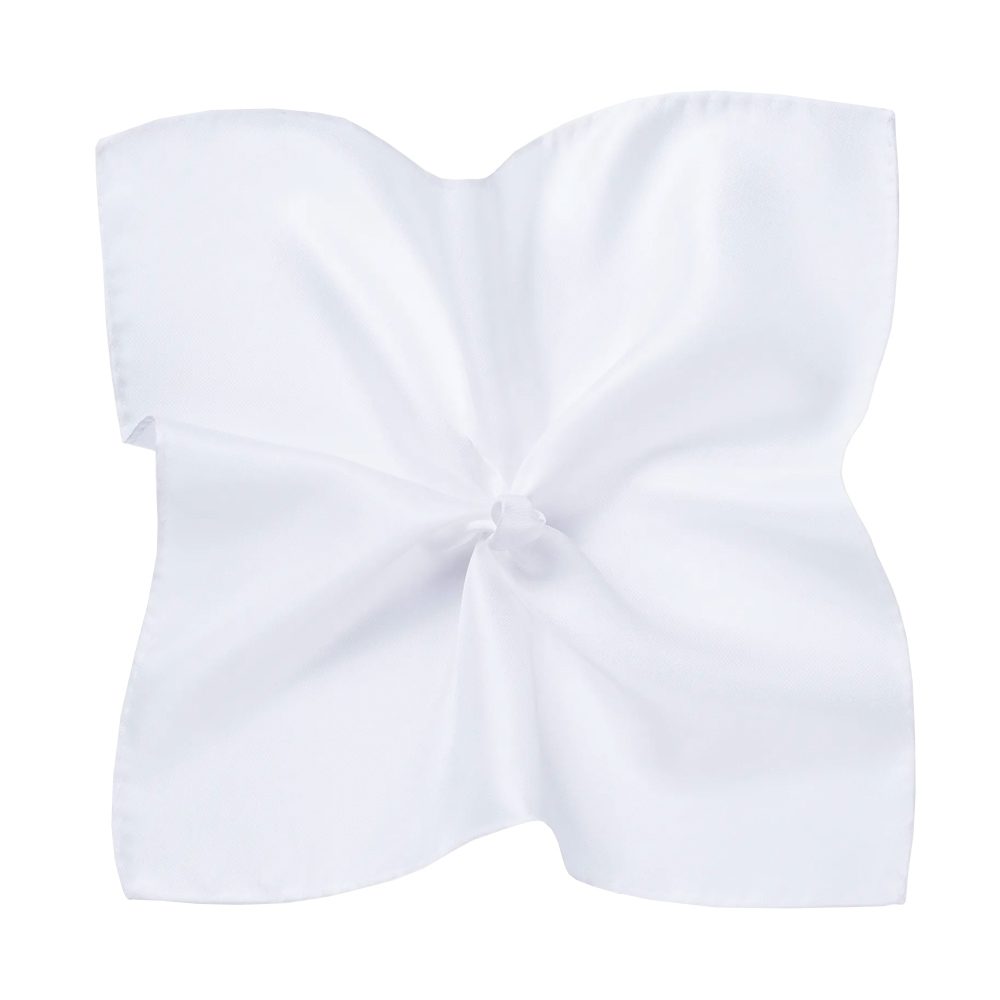
Favourbrook, founded by British menswear designer Oliver Spencer, is one of the best purveyors of black tie and velvet dinner jackets in London and while certainly at the luxury end of the market, will not damage your wallet quite as much as a Savile Row piece will. While you can find good off-the-peg styles by the bigger Italian tailors such as Zegna, Canali and Brioni, we’d steer clear of designer labels (with the exception of Tom Ford) because what you get in brand premium, you’ll lose in fabric quality and longevity. Don’t be fooled by fashion fads such as slim lapels or overly fitted silhouettes. Formalwear is timeless, not of a particular moment, hence why opting for a classic, traditional cut and style will save you in the long run. At the lower end of the market, expect to find synthetic/wool blends rather than pure wool options, but the likes of Suitsupply and Reiss make well-proportioned dinner jackets for under £300/$300 so if you’re off-the-peg size and need a quick fix, you could do a lot worse.
Morning Dress
Seeing the words ‘morning dress’ etched on an invitation strikes fear into the heart of some but there really isn’t anything to lose your head over. The rules of morning dress are pretty straight up and down, with the only real subjectivity coming from your choice of waistcoat, tie and pocket square (not to be taken lightly however). Without digging into its history too deeply, just know that the morning suit dates back to the late-19th century, where it evolved from the frock coat, which was worn by the gentry while on horseback. The frock coat was modified to feature straight front edges cut in such a way that they curved back into a sweep of cloth so as to unburden the rider’s knees from flapping coat edges. The side pockets were ditched to streamline the silhouette. It was Edward VIII in 1936 who instigated a sartorial change, abolishing the old frock coat as court attire, requiring instead the more sophisticated ‘morning coat’. The style survives to this day: a long, single-breasted jacket with peak lapels and curved front edges, which slope back to the tail. It’s worn with formal trousers (occasionally pleated, occasionally patterned with stripes or checks), a waistcoat and a white shirt (often with a cutaway collar).
Colour
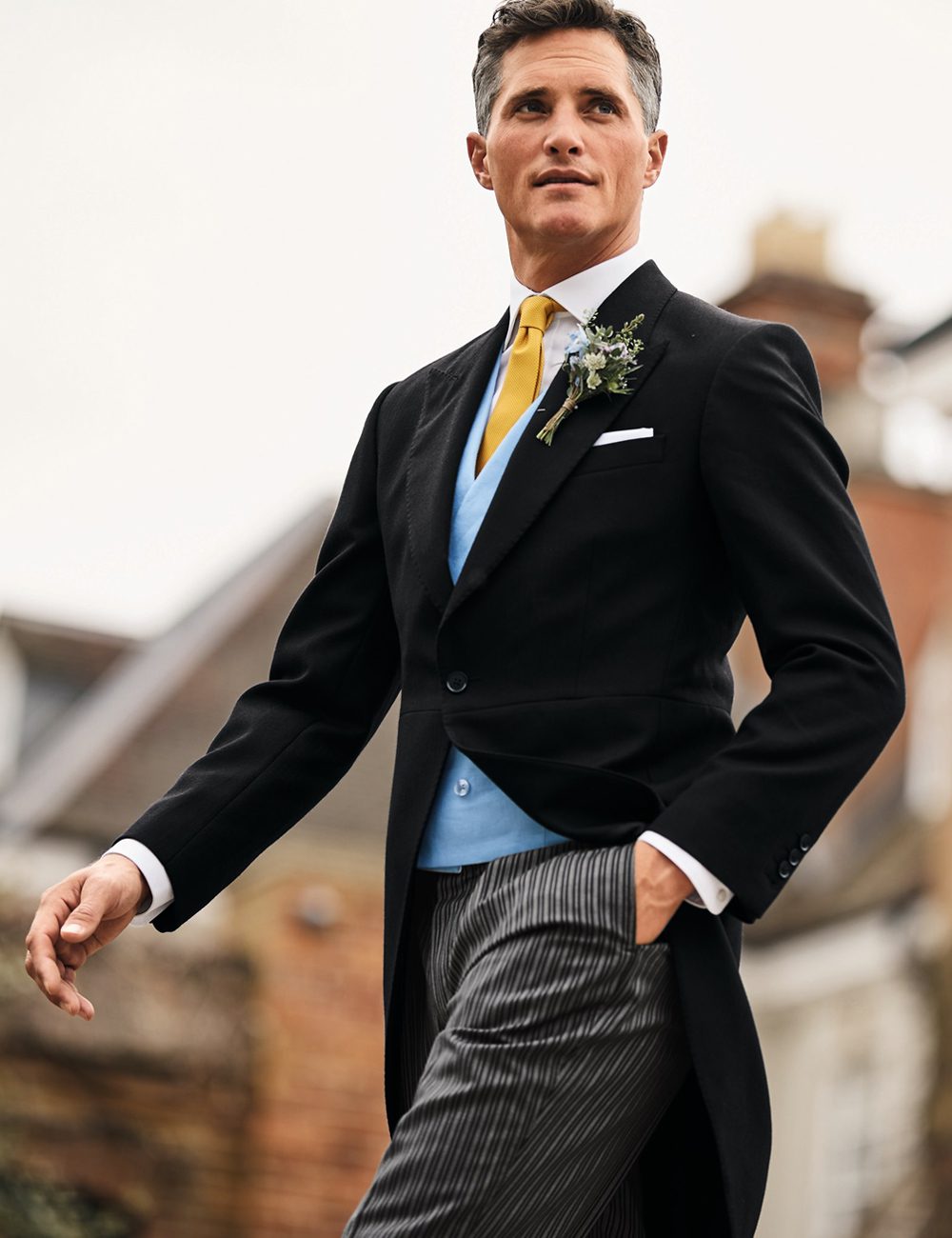
Charles Tyrwhitt
While black is the most common and preferred colour for the morning coat, it is not the only one. Charcoal and navy styles have gained in popularity over the years, with Prince Charles a great advocate of the former. Unlike the black coat, which is typically worn with contrasting charcoal striped trousers, charcoal and navy styles are always worn with matching trousers.
Jacket Fit
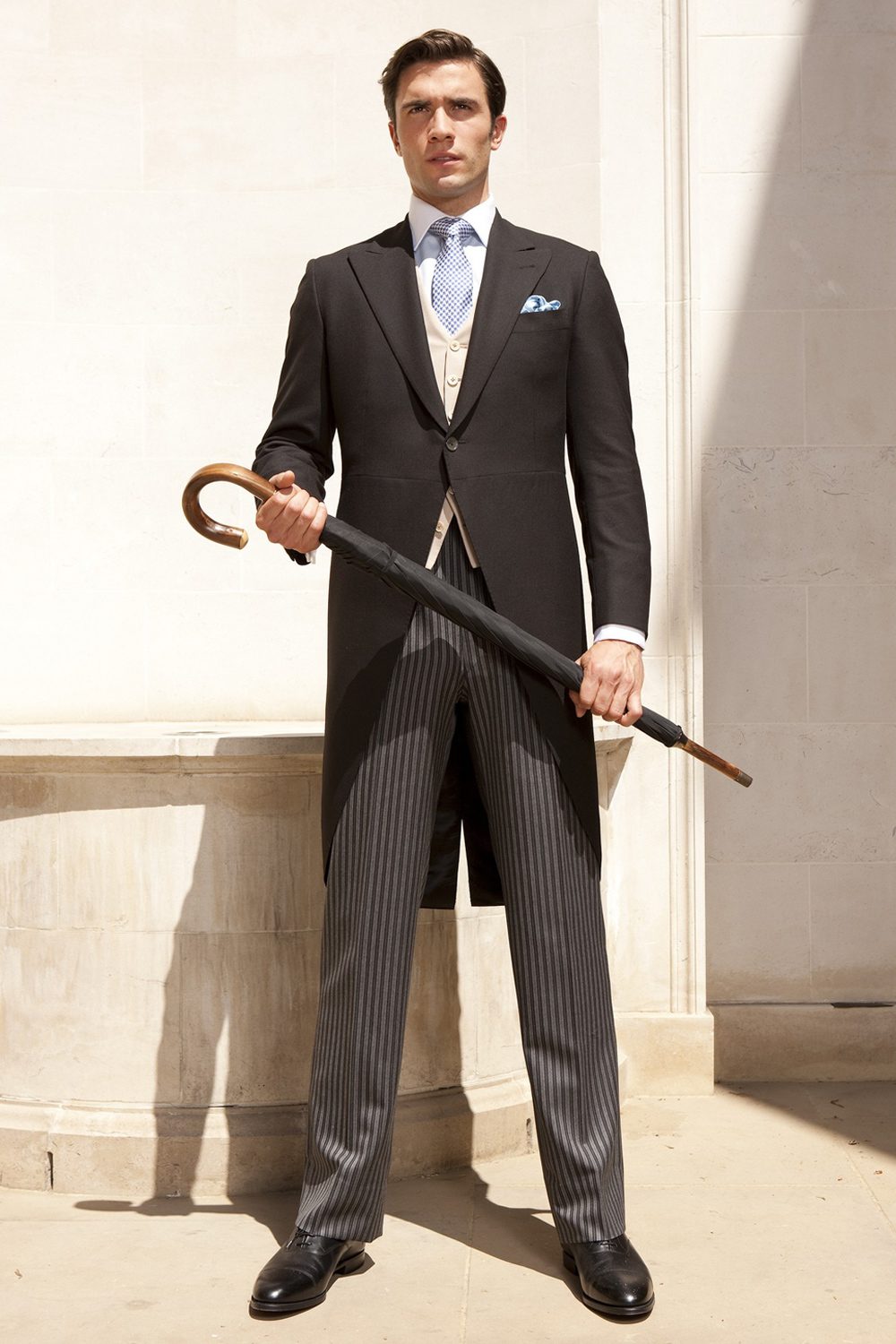
Huntsman
When it comes to being fitted for a morning coat, there are a few of key considerations. Getting the shoulder width correct is vital as there isn’t much a tailor can do to fix this area once the coat is made, so take the time to get it right. The coat should also fit snug to the contours of your torso, cinching at the waist and creating a swoop out over your backside. The tail should finish just below the fold of the knee, or an inch or two either side.
The Shirt & Trousers
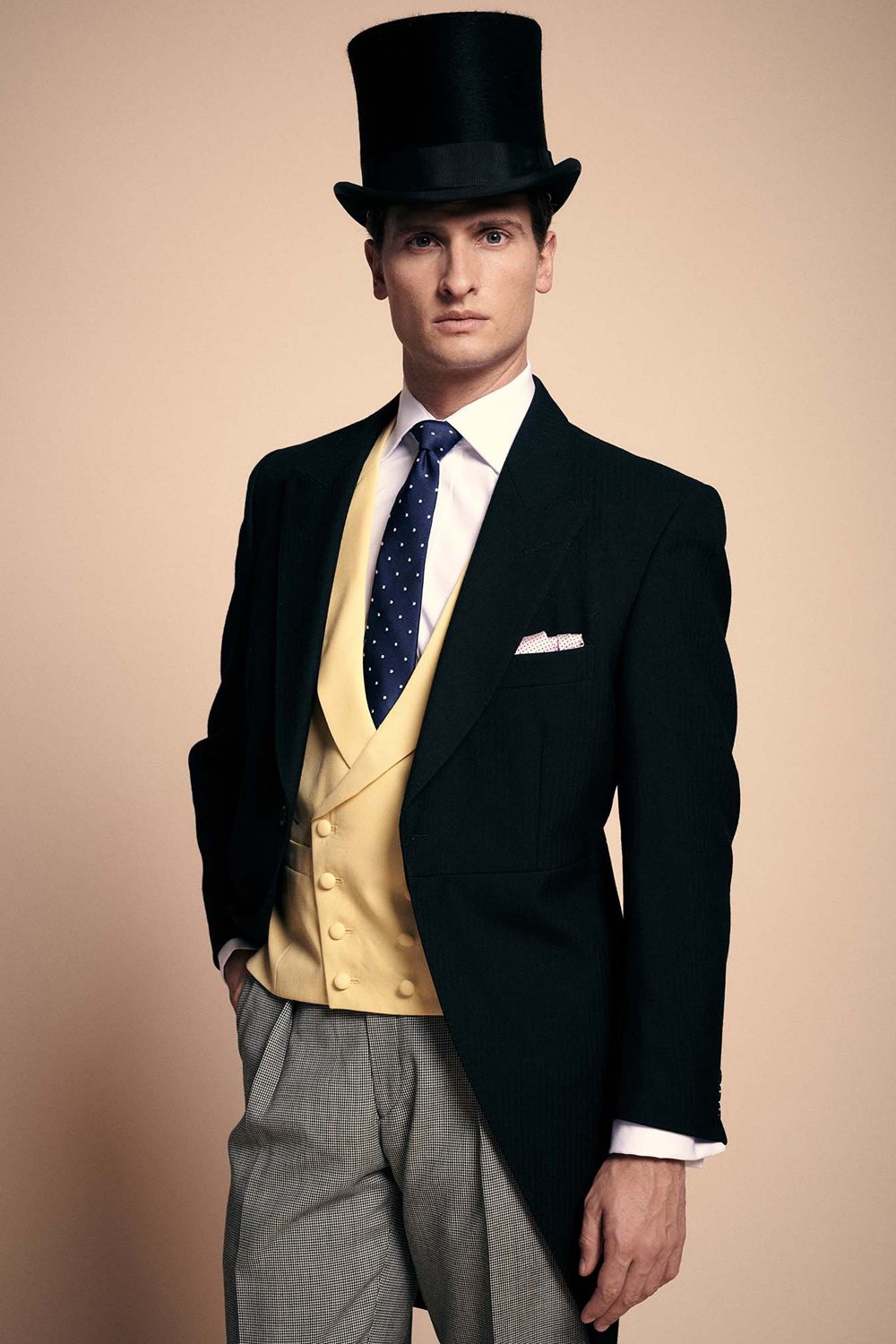
Oliver Brown
If you opt for the black morning coat, then you have a couple of different trouser styles to choose from. The most popular is the charcoal cashmere stripe (‘cashmere’ refers to the pattern strangely, and not the fabric – most are cut from extrafine wool), but you can also wear a lighter grey herringbone or houndstooth trouser too. One note on the shirt: if in doubt, classic white with a spread collar is spot on, but you can also incorporate a pastel version with contrast white collar if you’re feeling sartorially fruity.
Accessories
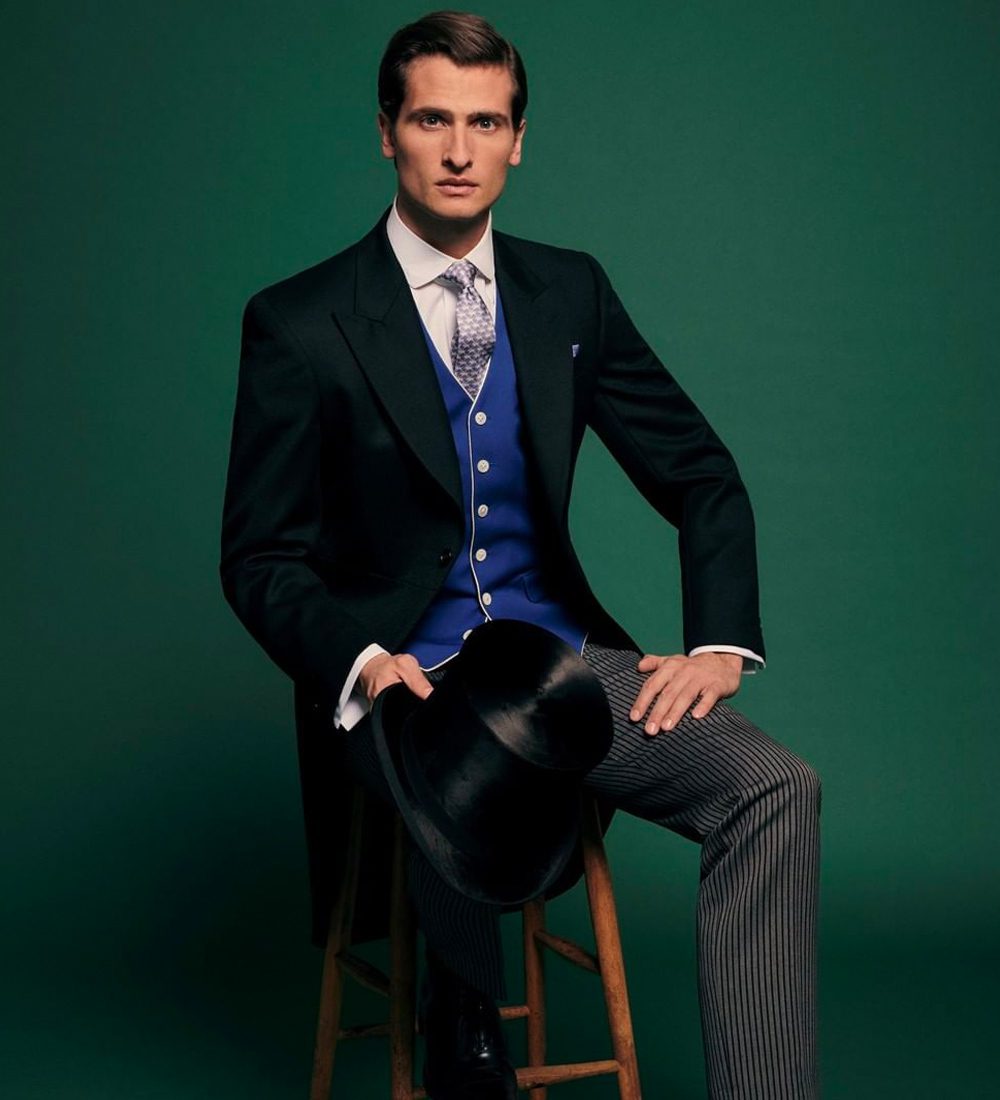
Oliver Brown
With morning dress, individuality comes not in the morning suit itself but in the accessories – namely waistcoat, tie and pocket square. If your instinct is to match the colours of this trio, then fight it. A subtle contrast here is ideal and adds no end of personality and character. The waistcoat can be either single or double-breasted (larger guys will find the former more flattering) and you actually have license to be quite extravagant, but don’t confuse that with gimmicky. If you opt for a patterned waistcoat then keep the tie and pocket square relatively plain (same goes in reverse). If there is one rule that must never be broken, it is that no amount of shirt should ever be seen below the waistcoat. Be especially careful of this rule when opting for a double-breasted style because of the squared-off finish. Wool or wool/silk blends are perfect for winter, while linen is a great option for summer.
The Best Brands For Morning Dress
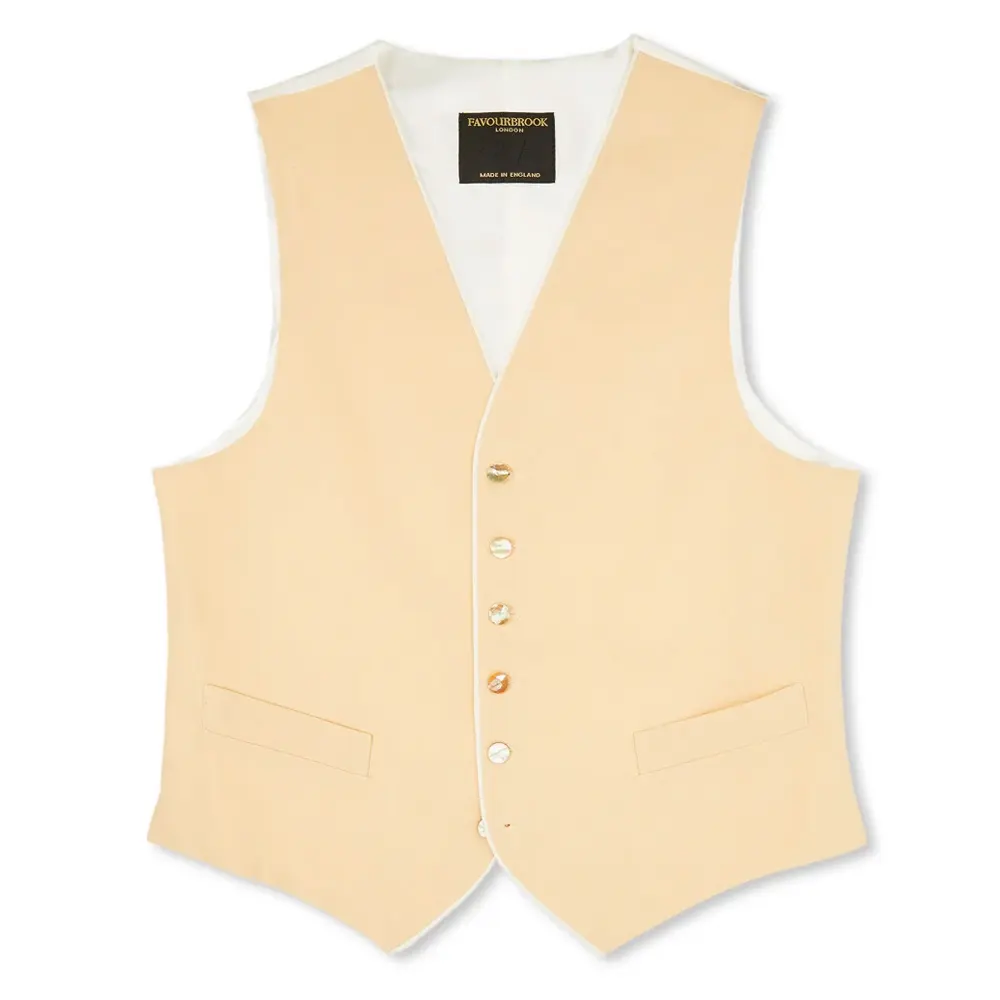
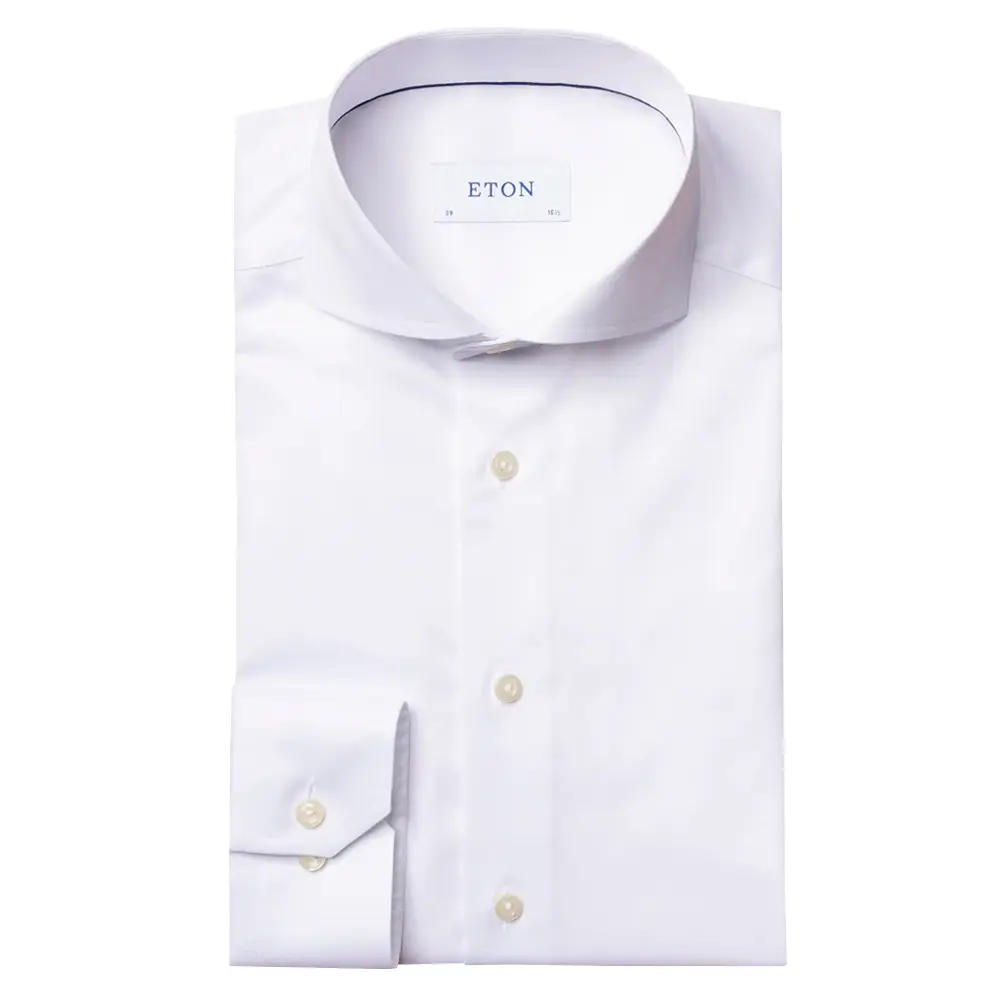
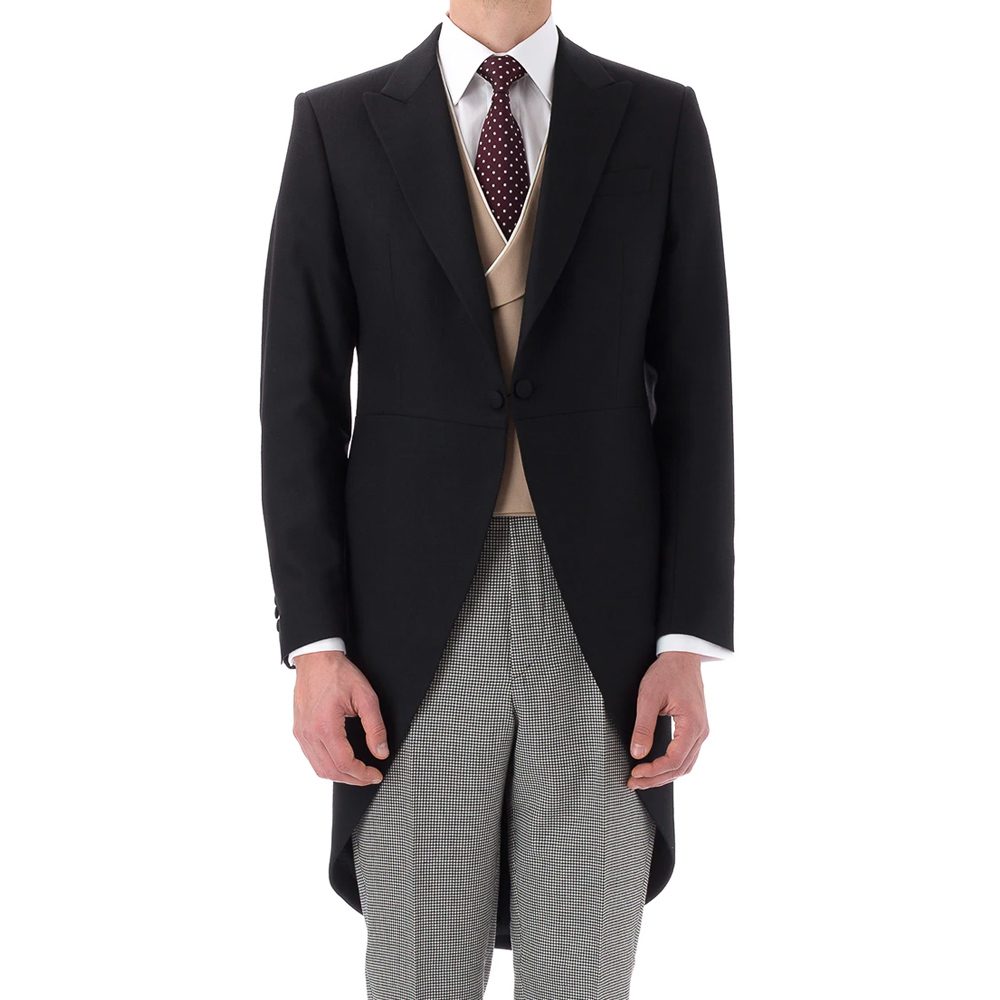
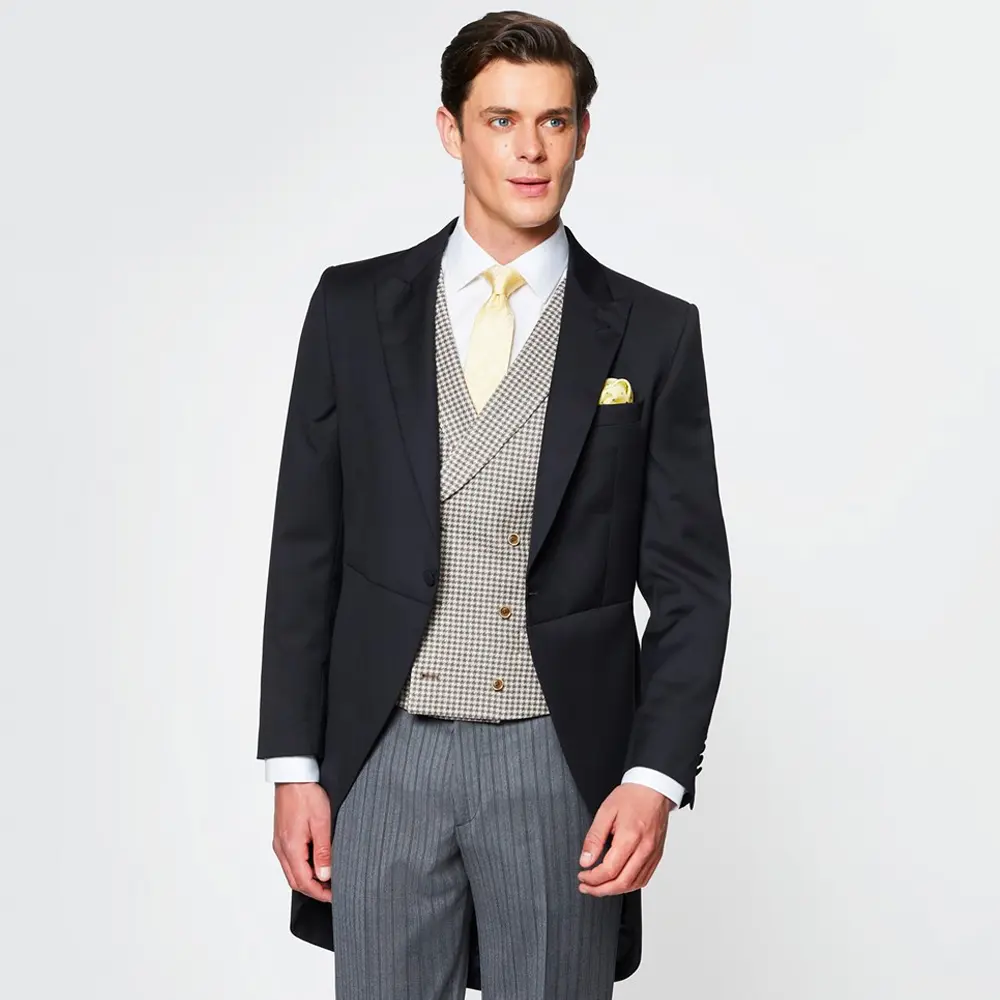
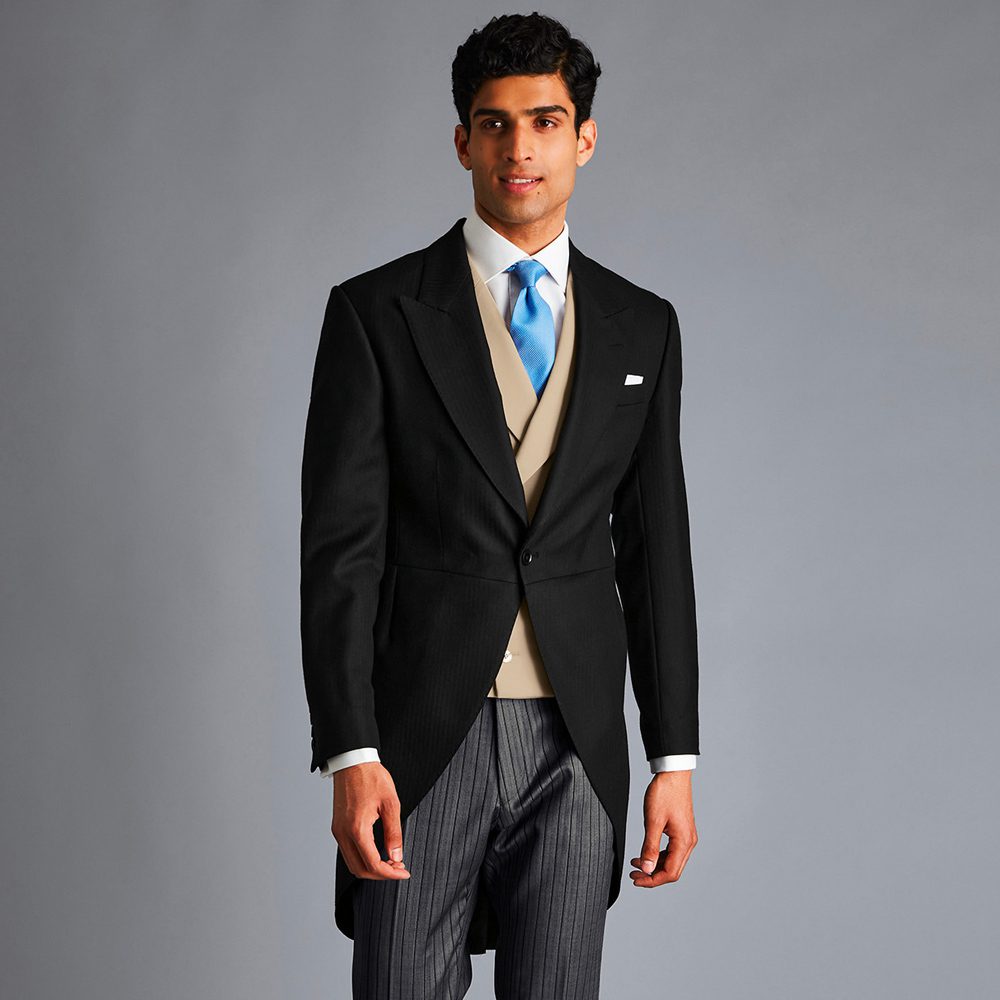
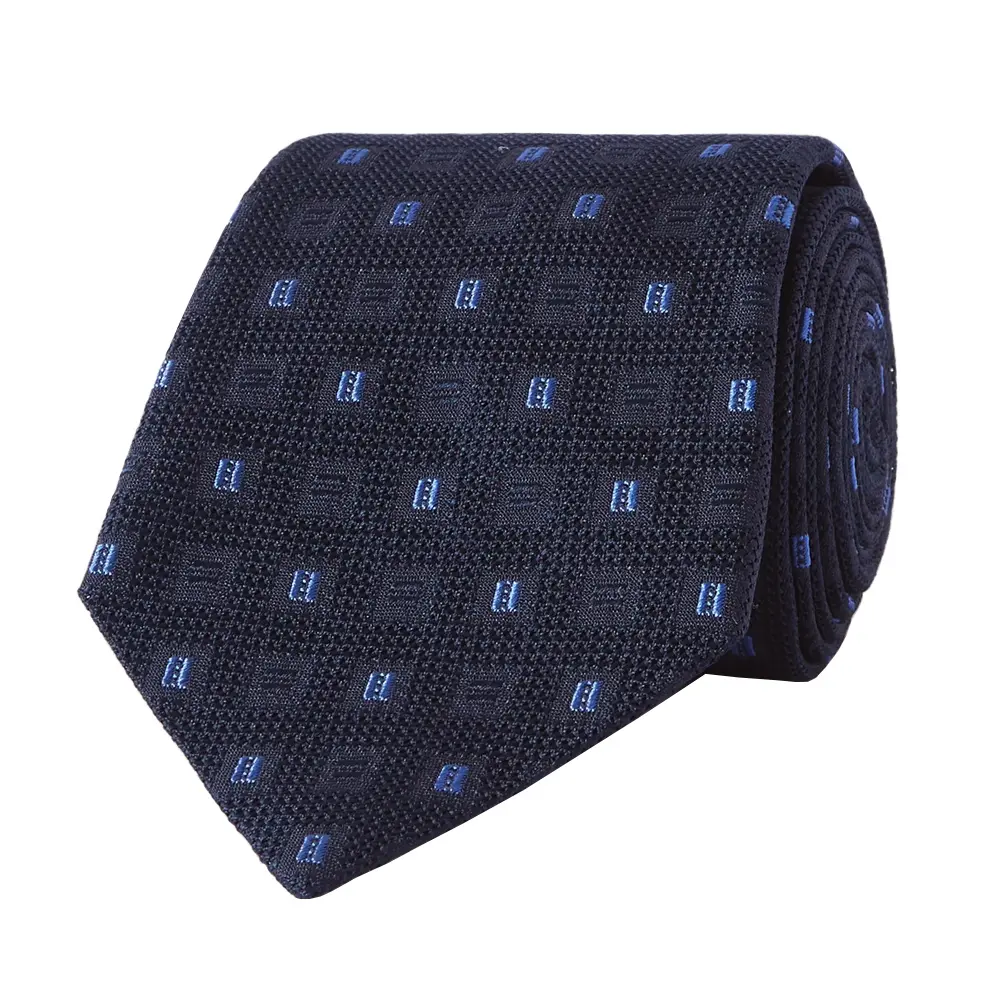
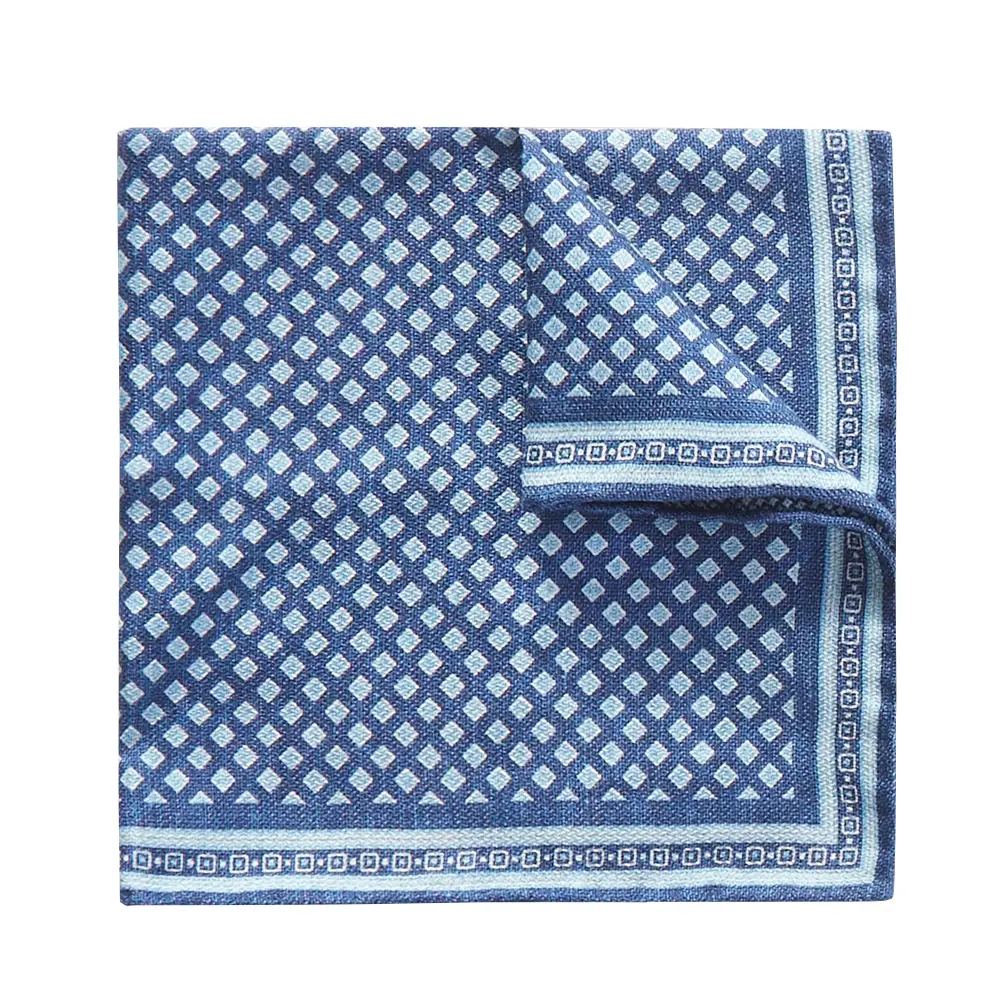
At the luxury end of the market, Favourbrook is a brilliant bet for both eveningwear and morning dress, but if you really want to push the boat out then Savile Row will present you with many different and alluring ways to part with your money. Anderson & Shepherd, Henry Poole, Huntsman, Ede & Ravenscroft et al are all excellent and will never let you down. At the affordable end of the market, Charles Tyrwhitt, Oliver Brown and Hawes & Curtis all produce quality morning dress that belies its more modest price tag.
Ryan Thompson Having cut his writing teeth in the heady days of magazines back in the noughties (when four-pint lunches were par for the course on press week), Ryan has specialised in menswear and lifestyle ever since. He has written extensively for esteemed global titles such as the Financial Times, while also taking up positions at Farfetch and The Rake. Now freelance, he spends his time in East Sussex mulling over the latest dog fashion trends, and more.
